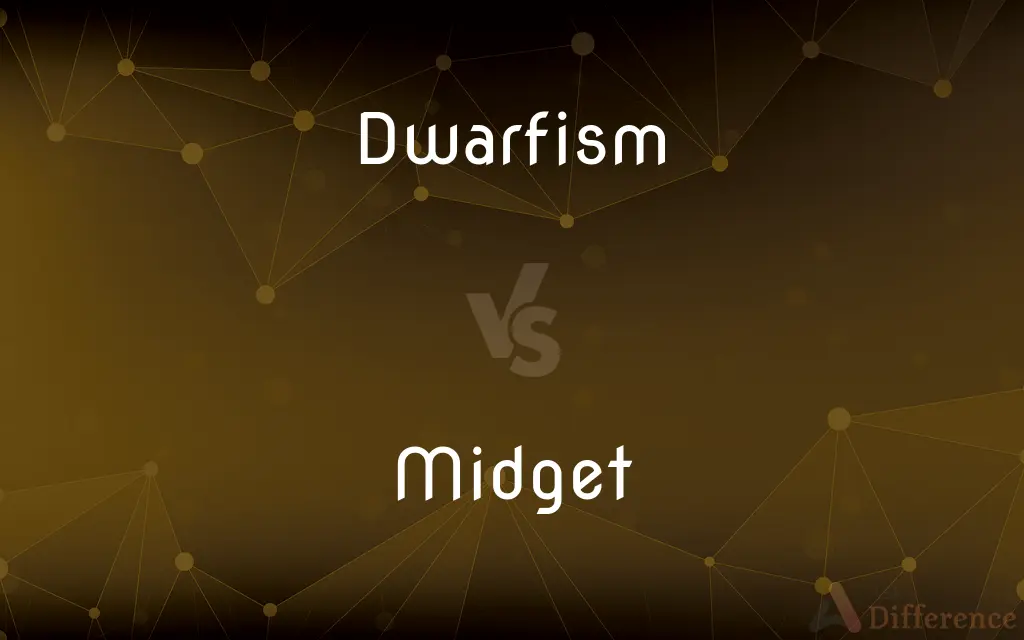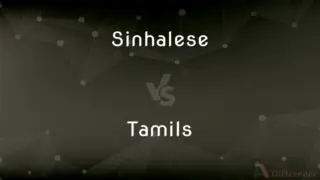Dwarfism vs. Midget — What's the Difference?
By Fiza Rafique & Urooj Arif — Updated on March 14, 2024
Dwarfism is a medical condition characterized by short stature, whereas "midget" is an outdated term considered derogatory.

Difference Between Dwarfism and Midget
Table of Contents
ADVERTISEMENT
Key Differences
Dwarfism refers to a variety of medical conditions resulting in an elder's height of 4 feet 10 inches (147 centimeters) or shorter, often due to genetic factors or hormonal imbalances. On the other hand, the term "midget" was historically used to describe a short-statured person with proportional body parts but is now widely regarded as offensive and has been replaced by more respectful terminology.
While dwarfism encompasses a broad spectrum of conditions affecting bone growth and development, leading to disproportionate or proportionate short stature, the term "midget" was mainly associated with proportionate short stature. However, its use has been discouraged due to its pejorative connotations and the evolution of language towards more respectful and accurate descriptions of medical conditions.
Medical professionals and advocacy groups emphasize the importance of using terms like "short stature" or "dwarfism" to describe individuals with these conditions, promoting a respectful and dignified approach. The derogatory nature of "midget" reflects societal shifts towards more inclusive and sensitive language, especially concerning individuals with physical differences.
Understanding dwarfism involves recognizing the various causes and manifestations, ranging from genetic disorders like achondroplasia to hormonal imbalances. In contrast, the eradication of "midget" from respectful discourse marks a move towards acknowledging the individuality and dignity of people with short stature, beyond outdated and offensive labels.
Awareness and education about the appropriate terminology and the diverse experiences of individuals with dwarfism are crucial in fostering an inclusive society. This stands in contrast to the historical usage of "midget," which often occurred within exploitative contexts, such as in circuses or entertainment, further underlining the importance of respectful and accurate language.
ADVERTISEMENT
Comparison Chart
Definition
Medical condition leading to short stature due to genetic or hormonal reasons
Outdated and derogatory term for a short-statured person with proportional body parts
Connotations
Neutral, medical
Derogatory, offensive
Usage
Preferred term in medical and respectful discourse
Considered offensive and not used in respectful discourse
Body Proportion
Can be disproportionate or proportionate
Historically referred to proportionate stature
Context
Medical, advocacy, and educational settings
Historically used in exploitative entertainment contexts
Compare with Definitions
Dwarfism
Medical condition.
Dwarfism is characterized by an elder height of 4 feet 10 inches or shorter.
Midget
Outdated term.
Midget is no longer an acceptable term to describe someone with short stature.
Dwarfism
Disproportionate or proportionate.
Dwarfism can result in disproportionate limb sizes or a proportionate short stature.
Midget
Importance of respectful terms.
Using correct terminology respects the dignity of individuals with short stature.
Dwarfism
Genetic or hormonal causes.
Achondroplasia is a common genetic cause of dwarfism.
Midget
Derogatory connotations.
The use of midget is considered offensive and derogatory.
Dwarfism
Advocacy and awareness.
Organizations advocate for the rights and dignity of individuals with dwarfism.
Midget
Shift in language.
Society has moved towards more respectful language, discarding terms like midget.
Dwarfism
Respectful terminology.
Person with dwarfism is a respectful way to refer to someone with this condition.
Midget
Once implied proportionality.
The term midget historically referred to individuals with proportionate body parts.
Dwarfism
The medical condition of being a dwarf.
Midget
Midget (from midge, a sand fly) is a term for a person of unusually short stature that is considered by some to be pejorative. While not a medical term, it has been applied to persons of unusually short stature, often with dwarfism, a medical condition with a number of causes including achondroplasia, and particularly proportionate dwarfism.
Dwarfism
The condition of being a dwarf animal or plant. In both senses also called nanism.
Midget
(Offensive) An extremely small person who is otherwise normally proportioned.
Dwarfism
The condition of being a dwarf person of short stature.
Midget
A small or miniature version of something.
Dwarfism
The quality of being puny or inferior.
Midget
A class of small objects, as a class of very small sailboats or racing cars.
Dwarfism
A genetic abnormality resulting in short stature
Midget
Miniature; diminutive.
Midget
Belonging to a type or class much smaller than what is considered standard
A midget automobile.
Midget
(originally) A little sandfly.
Although tiny and just two-winged, midgets can bite you till you itch all over your unprotected skin.
Midget
(loosely) Any small swarming insect similar to the mosquito; a midge.
Midget
Any short person.
Midget
(attributively) A small version of something; miniature.
The midget pony
Midget
A very diminutive person having normal proportions of the body parts; compare dwarf.
Midget
A person who is abnormally small
Midget
Very small;
Diminutive in stature
A lilliputian chest of drawers
Her petite figure
Tiny feet
The flyspeck nation of Bahrain moved toward democracy
Common Curiosities
Are all forms of dwarfism characterized by disproportionate body parts?
No, dwarfism can result in either disproportionate or proportionate short stature.
How should one refer to someone with dwarfism?
It's respectful to use terms like "person with dwarfism" or "individual with short stature."
Why is "midget" considered an offensive term?
"Midget" is deemed offensive due to its derogatory connotations and historical use in exploitative contexts.
How can one support individuals with dwarfism?
Supporting respectful language and understanding the condition can help foster inclusivity.
Was "midget" ever a medical term?
"Midget" was used in the past but was never a preferred medical term due to its pejorative nature.
What causes dwarfism?
Dwarfism can be caused by genetic factors, such as achondroplasia, or hormonal imbalances.
How has the perception of dwarfism changed over time?
Increased awareness and advocacy have led to a more respectful understanding of dwarfism.
Can dwarfism be treated or cured?
Some forms of dwarfism can be managed with medical interventions, but many aspects of the condition are lifelong.
What role do advocacy groups play in the context of dwarfism?
Advocacy groups promote rights, awareness, and inclusivity for individuals with dwarfism.
How can one learn more about dwarfism?
Engaging with reputable medical sources and advocacy organizations can provide accurate information.
Is it acceptable to use "midget" in any context?
No, the term "midget" is universally considered derogatory and should be avoided.
Why is it important to use respectful language when referring to dwarfism?
Respectful language acknowledges the dignity of individuals and avoids perpetuating stereotypes.
Can individuals with dwarfism lead normal lives?
Yes, with appropriate medical care and social support, individuals with dwarfism can lead fulfilling lives.
What is the significance of 4 feet 10 inches in the context of dwarfism?
This height is often used as a benchmark in the medical definition of dwarfism, distinguishing it from other height ranges.
Share Your Discovery

Previous Comparison
Sinhalese vs. Tamils
Next Comparison
Manny vs. NannyAuthor Spotlight
Written by
Fiza RafiqueFiza Rafique is a skilled content writer at AskDifference.com, where she meticulously refines and enhances written pieces. Drawing from her vast editorial expertise, Fiza ensures clarity, accuracy, and precision in every article. Passionate about language, she continually seeks to elevate the quality of content for readers worldwide.
Co-written by
Urooj ArifUrooj is a skilled content writer at Ask Difference, known for her exceptional ability to simplify complex topics into engaging and informative content. With a passion for research and a flair for clear, concise writing, she consistently delivers articles that resonate with our diverse audience.














































